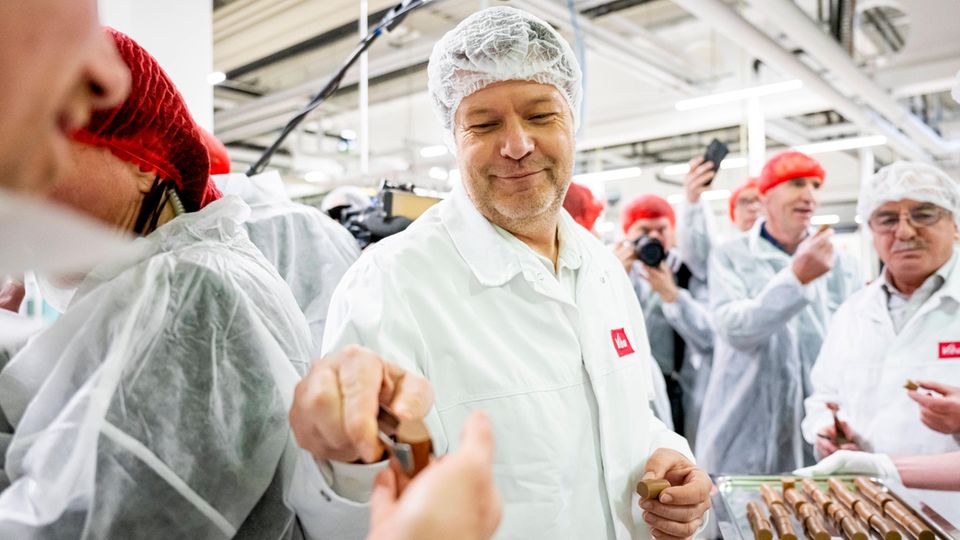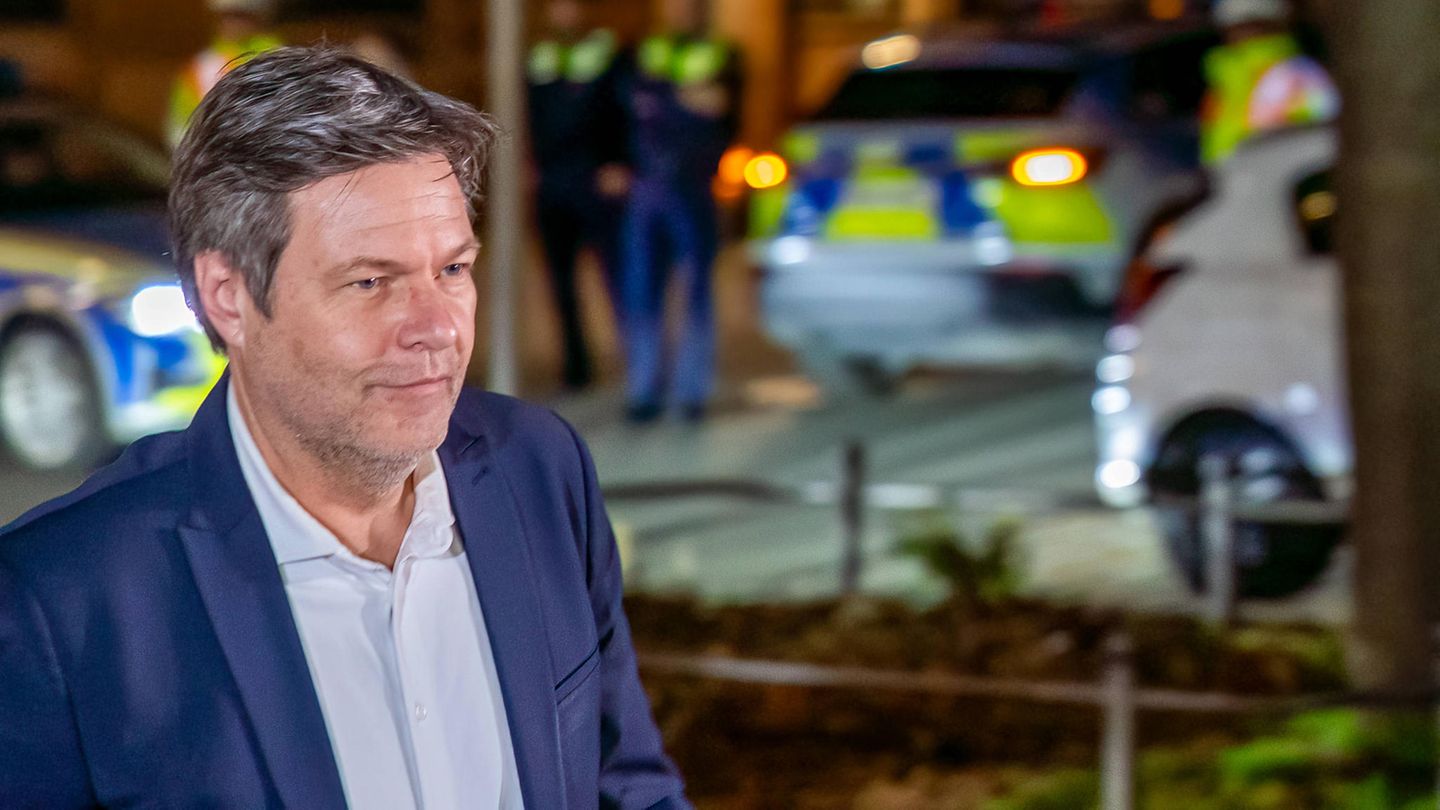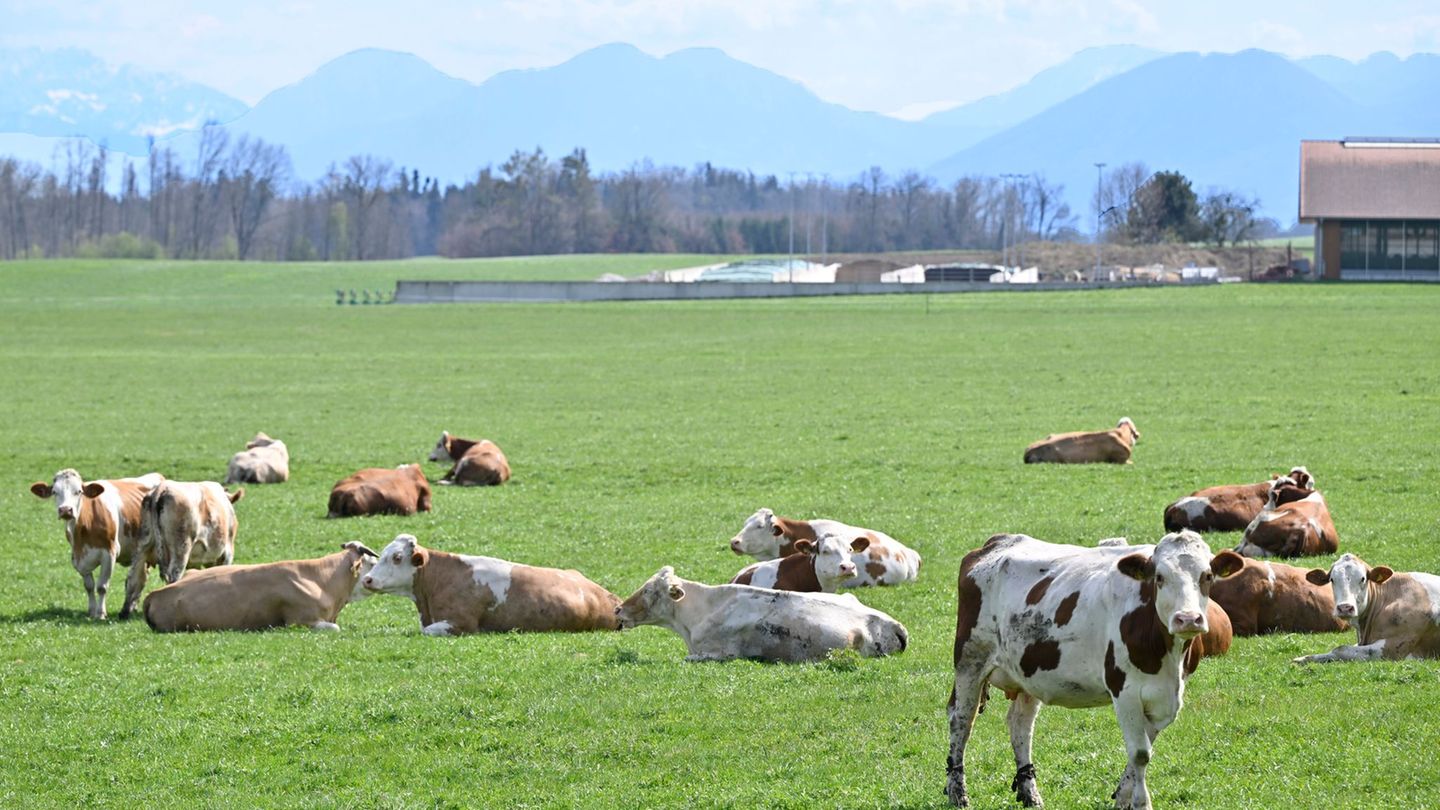Economics Minister Robert Habeck is on tour through East Germany. Right from the start he is met with pure anger. It’s about economic worries, the shortage of skilled workers – and “all that traffic light crap.”
“Seligenthal” is written on the yellow town sign. It sounds like a quietly babbling brook, like silence and peace. And this is very likely the case here on the southern slope of the Thuringian Forest 364 days a year. Only today the Green Vice Chancellor announced that he would be visiting the local confectionery manufacturer Viba. That’s why the peace and quiet ends right at the town sign.
Angry people have blocked the street. Some have brought their tractors with them, but it’s about more than just the dispute over agricultural diesel subsidies. It’s about arms deliveries to Ukraine, about refugees, about all this “traffic light” crap. The demonstrators chant “We’re fed up”. The “lying press, lying press!” don’t want to let them through. If they aren’t allowed to go to Habeck, then the press isn’t allowed either, that’s how they see it. “Close ranks,” one of the men shouts.
“Hang it!” some demonstrators shout
A few minutes earlier, as Habeck’s Audi rolled into the factory premises in the background via the only access road that was kept open by the police, individual demonstrators shouted: “Hang up!” Once inside, Habeck is already putting on a white coat, slipping into overcoats with his shoes, and a hairnet sits over his hairstyle. And now the Minister of Economics puts a small piece of melt-in-the-mouth nougat in his mouth, which an employee serves to the small group of visitors on a tray.
The star capital team
Are you interested in politics? – and read the most important information of the week, selected for you by our Berlin politics experts!
Hard on the outside, very tender on the inside – this is how the minister’s two-day tour through the two eastern federal states of Saxony and Thuringia ends. It is a short journey on which the Vice Chancellor takes a look into the abyss, into the effects of a shortage of skilled workers, bureaucracy, recession and a political brutalization that is no longer just a threat in some places.
The situation is “dramatically bad.” “The time for coziness is certainly over,” as Habeck himself predicted the day before, at a meeting with East German craft associations at the Leipzig trade fair. That’s why he set off, he wants to talk to the people himself, to the masters and journeymen, to the trainees and bosses at model companies like Jenoptik, to the highly skeptical representatives of the Chambers of Industry and Commerce in Erfurt.
“Write this to me!”
And the time is always too short, he always has to move on, he always says: “Write this to me” or “Give me this”, “Report to my state secretary”. In some cases, the minister may even reach out himself later, as an entrepreneur recently noted with appreciation on the business platform LinkedIn. He had written an angry letter to the minister, and suddenly he was in charge of it himself.
New star format
The pictures of the evening – in front of and behind the scenes
“The stupidest thing we could do is to remain isolated,” says Habeck. “Everyone with their worries and also their fears goes home, no one talks to each other and all prejudices take on a life of their own. And in the end we have a society where no one talks to each other anymore, all we do is shout.” Then a reading is canceled in Hamburg and an event in Berlin. Just yesterday, the Green Party’s political Ash Wednesday in Biberach, Swabia, had to be canceled due to protests that resulted in tumult. In contrast, it seemed almost unrealistically peaceful in Saxony on the first day of the trip, unusual given the poll numbers: 31 to 35 percent for the AfD, the Greens just above the five percent hurdle.
“Actually, we want to throw you all out again”
What if the AfD really becomes the strongest force here in the state elections in the fall – or as Habeck puts it, “if an ideology gains a majority that says: We actually want to throw you all out again”? By “you” Habeck means all those immigrants who have long been needed in Saxony and Thuringia to cope with the shortage of skilled workers.
700,000 jobs are reported as open, with more than 120,000 in skilled trades alone. Positions that can no longer be filled. “And open positions are work not done, so growth is prevented,” says Habeck. That’s why, beyond political decency and morality, how open a society is has long since become a highly economic question. Open for exchange, for trading goods and for people who work here.
In fact, the topic comes up again and again. There is the Leipzig carpenter who complains that his trainees quite reliably end up in the public service after the end of their training. Or at Porsche. There is the head of technology at Jenoptik, who is desperately looking for skilled workers, engineers and scientists: “We also need a society where people feel comfortable.”
“If you isolate yourself, you close down”
The high-tech company has therefore started the #stayopen campaign. Cards and stickers are laid out on the long tables in the bright company canteen, where Habeck meets three dozen trainees for discussions. “If you isolate yourself, you close down,” it says. Or: “Not open-minded? Excluded from us.” He was “very, very grateful to the business community for their absolute clarity on the issue,” said Habeck after the meeting.
He came as Vice Chancellor, as a minister, not as a Green campaigner. He wants to send a message, but just doesn’t want to overdo it. He didn’t mention the AfD publicly once in the two days. It’s all a question of dosage, as he himself learned at the craft fair. At the “World Skills” stand, a kind of Olympics for trainees, Habeck is supposed to solder a heart out of copper heating pipes: It has to be hot enough for the solder to become liquid. But if it gets too hot, it evaporates. “Nice metaphor,” says Habeck – but his tin still got too hot. He has to do it again, reaches for the gas burner – click, click – “Oh, the gas is out?” But not, someone had just turned off the tap. It’s a bit like real life.
Robert Habeck names three ingredients for the perfect storm
And in real life, the situation, as Habeck describes it, looks something like this: We have to continue to spend a lot of money on energy that has to replace Russian gas. I have to continue to spend a lot of money to equip Ukraine and the Bundeswehr. And we are currently earning less money because our largest sales market, China, is weakening, as is the global economy. These are three ingredients that can create the perfect storm, says Habeck when meeting with trade representatives. In one word: “dramatic”.

And while he’s on the subject of bad news: he’ll be presenting the new annual economic report next week. The growth forecast for the current year will no longer be 1.3 percent, as in the autumn report, but only 0.2 percent – “The time for comfort is certainly over.”
But what can the traffic light do?
The state’s options have been limited since the Federal Constitutional Court’s ruling at the latest. If we have to cut out another 25 billion euros in the next budget, which it already looks like, Habeck can do even less for the economy. Then he can only hope that at least domestic demand will pick up because the collective bargaining parties agree on good agreements. And even then you would be happy if there was at least one percent growth again in the end.
You have to put as many people to work as possible and spend the money you have so that it can be invested as quickly as possible. Habeck makes no secret of the fact that it would be nice to have more if it were up to him. And less so after Finance Minister Lindner. “Every decision has a consequence,” explains Habeck on Wednesday evening under a glass dome at the readers’ forum of the “Leipziger Volkszeitung”. This needs to be discussed honestly. “And don’t act as if everything is possible for free.”
But where should all the worries go? There is the potato farmer from Delitzsch who is worried about the high energy prices. The entrepreneur who is already frightened by the debate about the four-day week. The Leipzig plumber who still harbors a grudge against heating.
“Foreseeably completely destroyed”
Just a few days ago, the “Heringsdorfer Kreis”, a group of East German IHK bosses, sent an open letter to the Chancellor “with great concern”, and his deputy also received it. Another urgent wake-up call to the traffic lights. “If nothing fundamentally changes in your actions and demeanor,” the business representatives wrote, “we fear that one East German state after the next will become a place of desire for right-wing extremists and an economic transit country.” Settlement and immigration would “foreseeably be completely destroyed”.
Habeck speaks of a “critical but constructive tone” after the meeting with the representatives of the Central German Chambers of Industry and Commerce in Erfurt. You’re not allowed to quote from the group, but this much is allowed: the frustration is palpable. Many people have the impression that “the economy is not being listened to enough,” explains the local IHK boss afterwards.
And that is perhaps the only thing that unites the entrepreneurs in Erfurt with the demonstrators in Seligenthal: the feeling of being ignored. The angry group continues to block the road, not letting anyone through. The mood is hostile, irritable and even aggressive. The police do not want to intervene out of fear that the situation could escalate.
This is now “the normal situation, that federal ministers are received with protest,” says Habeck after the tour of the nougat factory. He is standing at the back exit of the factory. He doesn’t want to be misunderstood, especially here, in the east of the country. Protest is part of democracy and it is the duty of every politician to endure it. But protest has to lead somewhere, at best to a conversation. “I think the fact that the protest prevents people from talking to each other is a dangerous development,” says the minister. Then he gets into the Audi and drives on towards Bavaria.
Source: Stern
I have been working in the news industry for over 6 years, first as a reporter and now as an editor. I have covered politics extensively, and my work has appeared in major newspapers and online news outlets around the world. In addition to my writing, I also contribute regularly to 24 Hours World.




